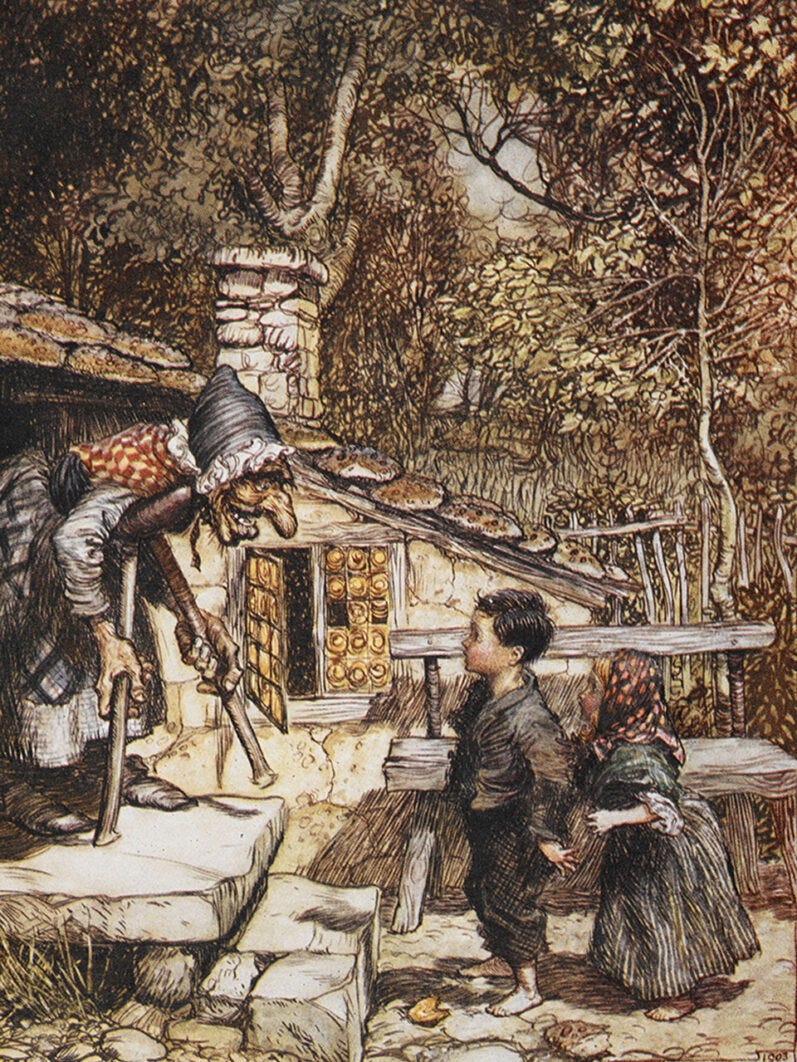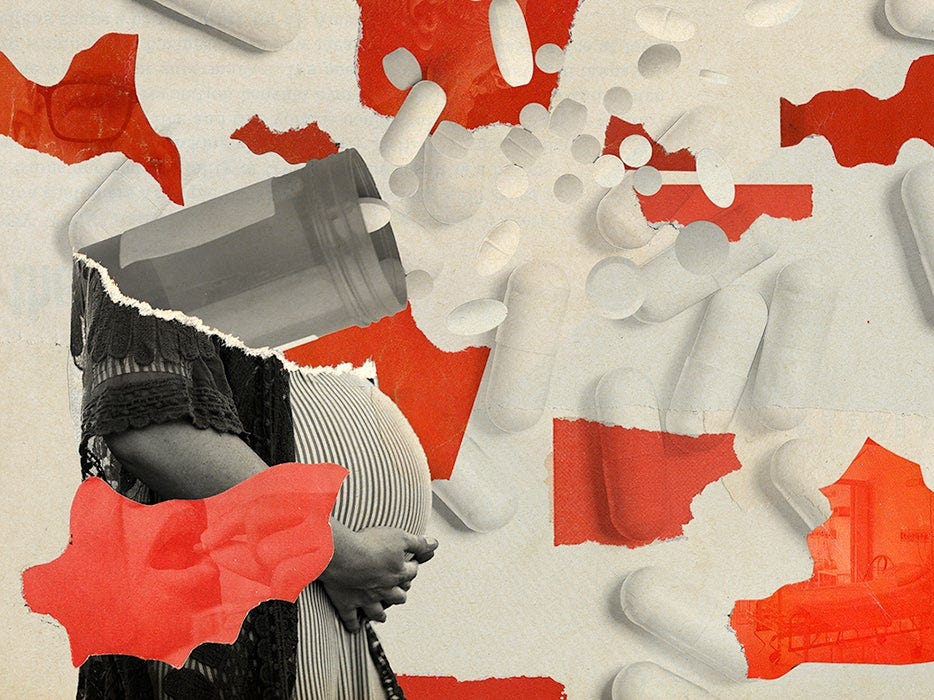The Saturday Read: God Mode
Inside: The AI arms race, Elon's smash and grab, the inscrutable Starmer, Bridget Jones, the Brothers Grimm, the Chagos Islands, British surrealism, and Reform's roadshow politics.
Good morning. Welcome to the Saturday Read, the New Statesman’s guide to politics, culture, books, and ideas. This is Finn with Nicholas and George.
I’m old enough to remember the received wisdom of summer 2024: boring politics was back and that was a good thing. What else could we possibly expect under the literal and legal mind of Starmer and his chancellor – sensible people perhaps, but certainly not with elan to go spare.
Such declarations were premature. As quiet as Starmer might want to keep things domestically, Britain is bound to be sucked into the chaos vortex created by a more capricious second-term Trump in the White House.
The President has already taken the world right to (and then back from) the precipice of a trade war. Then, perhaps his most outlandish overture yet: the US should take over Gaza, moving its entire population, to run a “riviera of the Middle East”. Elon Musk, meanwhile, has taken a sledgehammer to establishment America. All of a sudden the “move fast, break things” mantra doesn’t seem to go far enough.
We’ve got you covered on all of that, and more, below: Andrew Marr finds Starmer hard to read, while Tanya Gold finds Bridget Jones an even less worthy hero than before; John Gray laments the sanitised modern-day fairy tale and Michael Prodger gets a dose of the surreal; Hannah Barnes investigates the folly of the British medical establishment; and Jason tags along with Reform.
As ever, thanks for reading and have a great weekend.
1—“Singular power”
With the arrival of DeepSeek last week, China and the US are locked in an arms race. But this is not merely about who can develop the best AI technology – it’s about who gets to define the parameters of reality, Bruno Maçães explains (and warns). FMcR
Throughout history new technologies have raised the destructive potential of direct conflict. In the AI age, a new avenue has opened: states can now fight one another not by winning in direct battle but by building the world that everyone else must inhabit. Imagine a time when there truly is a global brain directing every social and economic activity. It might be possible or even easy to insert a specific policy or aim to which these activities must contribute, and to hide this policy so deep inside the model that no one – apart from those who built it – will ever know it is there.
2—“Completely unreadable”
The title of Get In, Patrick Maguire and Gabriel Pogrund’s inside account of the Starmer project is – what? An imperative, an exclamation, a mission statement? Despite all its scoops, details and research, the same ambiguity hangs over the book’s unknowable subject, writes Andrew Marr. NH
(Andrew is joined by the authors of Get In on our podcast here)
This is certainly a book you need to read to understand this government – though “government” shouldn’t just mean the leader… In the end however, I found it a deflating book published at a deflating moment. Starmer is a tough, disciplined, decent man who may well be able to stay the course. He would have been better served by a fuller account of his actual political thinking, and how he sees the better Britain he wants to build. In one uncharacteristic flash of irritation, Starmer insists: “There is no such thing as Starmerism, and there never will be!” This reader, for one, hopes he is wrong, and that this is not the final verdict.
3—”Credulous, infantile, lost”
I love anything Tanya Gold commits to paper, and her essay on Bridget Jones is no exception. Whoever sold us the lie these books contained some kind of feminist paragon? No, they marketised female self-hatred and invited us to laugh – mockingly, jeeringly, cruelly – at ourselves. FMcR
In the second book, she is commissioned to interview Colin Firth in Italy for the Independent: the newspaper where Bridget was born in a column in 1995. She misses the plane because she is trying on a bikini; asks Firth, “Who is Neacher?”(she means Nietzsche); tries to kiss him; and ultimately submits a transcript rather than an interview. That scene gave me a panic attack: who would do this? (A woman with no powers of criticism, or analysis.) Even so, the Independent likes it: “Anything that gets letters is good no matter how bad it is.” There are hints here of a worse future, for both women and for journalism.
4—“An avatar for the ancien régime”
Lord William Waldegrave has enjoyed a “quadrangle-to-quadrangle” existence, passing between institutions like Eton, Oxford, and the Palace of Westminster. He can also be found at Coutts & Co, where he met Nick to talk constitutional reform. GM
Public hostility to hereditary privilege and paid-for education is part of a wider rancour towards political elites of any sort, who are variously seen as venal, bungling and detached. I asked Waldegrave if public schools and the Lords are failing to inculcate the elite with noblesse oblige: responsibility, duty and public service. “It’s easy to mock noblesse oblige,” he said, “but let’s have a modern doctrine that attaches the billionaire to public duty in the same way.” His model elite is one of service and obligation – the opposite, he said, of the oligarchic tendencies of Silicon Valley plutocrats, whose reckless libertarian influence on parts of the Conservative Party deeply concerns him.
5—“There is no resisting that faith”
Was Orwell right that religion, like all orthodoxies, ruins novels? Or is Catholicism responsible for great art, even to the degree that art might be where religion endures longest in our atheist times? John Mullan surveys the landscape and the future of the Catholic novel. GM
The recent British novelist most influenced by Catholicism is probably Hilary Mantel, as alert as Spark to that possibility of human evil that Catholics recognize. However, Mantel, who had a strict Catholic upbringing, explicitly renounced her Catholicism: “I’m one of nature’s Protestants. I should never have been brought up as a Catholic”. In Wolf Hall and its sequels, Thomas Cromwell embodies an enlightened Protestantism, while the staunchly Roman Catholic Thomas More is repellent. Yet her earlier novels, in which the mystical and the numinous co-exist with the ordinary (as they do in Spark), are unimaginable without her early Catholicism. One of the most extraordinary, Fludd (1989), set in a small Northern town in the 1950s, concerns a visitation to a Roman Catholic community of a curate (Fludd) who seems to have miraculous powers. He might be a devil or a saint. The novel is scathing about repressive powers of the Catholic Church, yet it is also the product of a Catholic imagination.
To enjoy our latest analysis of politics, news and events, in addition to world-class literary and cultural reviews, click here to subscribe to the New Statesman. You'll enjoy all of the New Statesman's online content, ad-free podcasts and invitations to NS events.
What a fine civic pleasure to attend, for free, the recording of Radio 4’s Today debates! You go to Broadcasting House, the heart of the BBC at the top of Regent’s Street. There is George Orwell, there is the plaza up which a tank drove to protest Jeremy Clarkson’s sacking, and here, once you’ve passed through an airport-style security gate, is your seat. The question on Tuesday was whether it’s possible to go for growth at the same time as going green. One civilian, slightly too eager and slightly too drunk, was escorted out in a pleasingly British way: “Excuse me sir, if I could just speak to the gentleman… Excuse me sir, would you please come with me?”
And the panel, as they emerged, seemed to represent a Beebishly responsible spectrum of stance. Then they started speaking. The heads of the RSPB and the Chamber of Commerce agree the £100m HS2 bat tunnel was absurd. Green energy slugger Dale Vince and Sunak-advising economy boffin Tim Leunig both want us to grow greenishly. Or was it to green growthishly?
More than 30,000 people suffer an out-of-hospital cardiac arrest in the UK each year, and fewer than 1 in 10 survive. It’s why Sky Bet and the British Heart Foundation are asking 270,000 people to learn lifesaving CPR. Join the 100,000 who have already started by clicking RevivR.
6—“The unruly human animal”
Rewritings of Brothers Grimm fairy tales tend to launder them of their cannibalism and savagery. But the brothers had a different view, writes John Gray: their stories don’t restate our moral values; they suspend them, opening the imagination up to darker, elemental forces. NH
The unsettling effect of the stories persists, and some have identified its source in political history. Under Hitler’s National Socialists, the Grimms’ tales were used in anti-Semitic propaganda, and banned by the Allies in schools for a time after the Nazis were defeated… Clearly, Romantic nationalism cannot be equated with Nazism. It would be wrong, though, to regard the Grimms simply as industrious scholars. In stories such as “The Jew in the Thornbush” – in which a youth compels a Jew, finally hanged as a thief, to dance in a hedge where his coat is ripped and his flesh torn by thorns – they vented anti-Semitism. Authenticity is a slippery idea. In politics, it is easily conjoined with murky notions of the malignant influence of minorities.
7—“Spiritual and ecological”
British artist Ithell Colquhoun was kicked out of the Surrealism movement for refusing to give up her fealty to the occult. But she was so “profoundly strange” anyway that maybe the official affiliation wasn’t necessary. Michael investigates the artist, subject of two Tate exhibitions this year. FMcR
In the Sunset Birth (1942), she painted another well-known stone group, Mên-an-Tol – a pierced stone flanked by two uprights. She had once wriggled through the hole-stone hoping for a cure for rheumatism but was “disappointed with the result”, having failed to recall that for it to be efficacious, she needed to be naked. In the painting, strings of coloured energy delineate the shape of a woman stretched through the hole and touching the bookend stones – creating a circuit board of spiritual and ecological energy. At exactly this time, Barbara Hepworth was experimenting with string sculptures just a few miles across the moors at St Ives.
8—“An out-of-control blaze”
In this week’s viral sensation, Jill Filipovic dissects Elon Musk’s “swift and stunning” destruction of Washington’s political architecture. But American democracy will only fall if it stands idly by: if congress created USAid, it can stop an unelected individual from dismantling it. GM
Musk seems to have brought in his own lackeys to staff up Doge, and it’s unclear who most of them are, given that they are not long-standing federal employees (those people are being put on leave, encouraged to quit or have been pushed out). Last November, Musk tweeted that he was seeking “super high-IQ small-government revolutionaries willing to work 80+ hours per week” for Doge. Wired has since found a few of the hires, and they’re men in their early 20s with no government experience. They are not public servants. They do not seem to be adhering to the same ethical and transparency requirements as other federal employees, and given their position underneath the executive umbrella the Trump administration may argue they don’t have to. It’s unclear if they’ve all been subject to security screenings. And they have access to vast amounts of federal government data and information, some of it classified.
9—“Are they serious?”
Reform UK currently resembles a roadshow so much as a political movement. Attending one of the party’s get-togethers in northern Essex, Jason asks the question on everyone’s lips in Westminster: is this the unofficial opposition? NH
Wes Streeting is wrong merely to dismiss Farage as a “miserabilist”... Farage is not miserable. He has an upbeat message, jauntily delivered: the established parties have failed this great country, and Trump in America has lit a pathway through the dark to a new conservative era. He denounces liberals, progressives and “wokery”, but he is never pious and never talks down to Labour’s cherished “working people”. Recent polling by Hope Not Hate, on a constituency-by-constituency model, forecasts that Reform could win up to 76 seats from Labour if an election were held now. On 3 February Reform led a YouGov voting intention poll for the first time. As Farage keeps saying, something is going on out there – here, and in all Western democracies, as the populist right rises – and Labour has had fair warning.
10—“Inflict further wrongs”
A rash and poorly-evidenced decision by the British medical establishment that could put thousands of lives at risk… Epilepsy drug valproate endangers pregnant women – so was prohibited for men. Hannah investigates. GM
It’s clear that both women and men with epilepsy are being poorly served. Women who were so badly let down by not being told of the risks of valproate are still being failed. Women who continue to take valproate through pregnancy are not routinely followed up with unless they are part of a medical study. Research into the effects on men is even further behind. Little is known about the other anti-seizure medicines, and whether they too might prove harmful.
George’s Best of the Rest
Leo Robson: Bob Dylan, Mister Lonely
Sam Kriss: Alt lit
Kat Rosenfield: The raunchy right has triumphed
John Ganz: Groyperfication
Sarah Dawood: Music under the Taliban
Constance Grady: Why American Psycho endures
Alice Volpe: What if you threw a party tonight?
Thomas Aquinas’s face finally revealed after 750 years. Finally!
And with that…
Britain cannot think straight about small islands threatened by foreign capture. Distant naval bases, cruel seas, the risk of national humiliation – it all makes you (this writer included) want to leap aboard a frigate and sail to the rescue. Witness the fit of Second World War re-enactment this country threw itself into during the Falklands War. Journalists at the Sun mounted a Churchill portrait in their office; Margaret Thatcher quoted Queen Victoria; at moments, one imagines, Margaret Thatcher became Queen Victoria.
Britain currently risks what, in the eyes of many citizens, amounts to an elective humiliation. The history behind the Chagos Islands – particularly the forcible displacement of thousands of native inhabitants by this country – does nobody much credit. But the deal over the Chagos recently negotiated by our government has little to do with compensating them. Our government has reportedly now agreed to hand over sovereignty of the archipelago to Mauritius with an accompanying sum – as the Times has speculated – of up to £18bn (both the UK and Mauritius have denied this figure), as some sort of tip. Bearing in mind Britain has already paid for the Chagos Islands once, in 1965, and that China is among Mauritius’s chief allies and patrons, this does not seem a very realistic sort of progressivism.
Reform and the Conservatives are already capitalising, drawing on the deep well of post-imperial grievance in British society. On Wednesday Nigel Farage used a parliamentary question to ask how we could afford this deal while removing winter fuel allowance from a 99-year-old, Clacton-based Second World War veteran. Its up to Starmer now to sell his decision, or risk conceding even more to Farage's rhetoric.
The New Statesman is home to the finest writing on politics, culture and ideas. To stay up to date, subscribe using the link above.
— Finn, Nicholas and George.



















